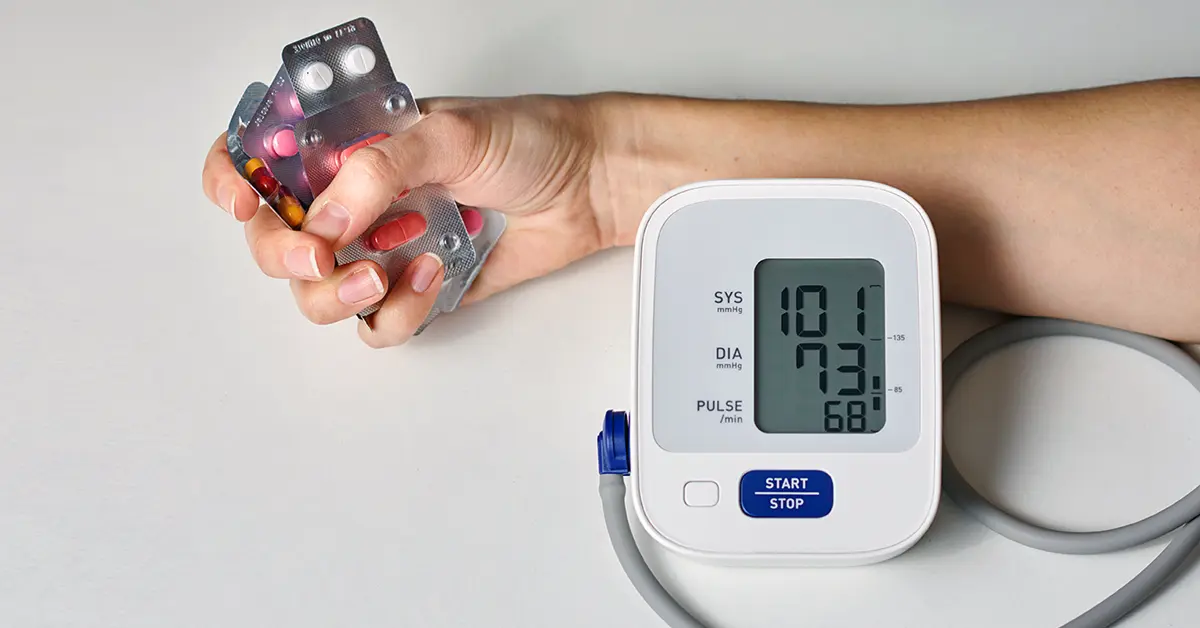
Did you know that about 28% of Indians are affected by high blood pressure, and 17% of them are already on medication? Managing hypertension often requires a combination of medication and lifestyle changes.
With various blood pressure medications available, your doctor will choose the one that’s best suited to your unique needs and health conditions. But do all blood pressure medications work the same way? Absolutely not!
Each type of medication works differently in your body. Let’s learn the top eight classes of blood pressure medications that can help you manage high blood pressure and improve your quality of life.
Find your heart's true age to prevent complications.Heart Age Calculator
Here are the top 8 types of Blood Pressure Medications
1. Diuretics
Ever heard of water pills? That’s just another name for diuretics. These are often the first medications prescribed by doctors for high blood pressure.
Diuretics help your body get rid of extra salt and water by increasing urine production. This, in turn, reduces the amount of blood your heart has to pump, which helps lower your blood pressure. They’re effective, affordable, and a trusted starting point in hypertension management.
2. Beta-Blockers
Beta-blockers do double duty by lowering blood pressure and helping your heart work more efficiently. These medications block the effects of adrenaline, a hormone that makes your heart beat faster and tightens your blood vessels.
Beta-blockers calm these effects of adrenaline and help blood flow more smoothly, reducing the heart’s workload. They’re crucial if you have other heart conditions along with high blood pressure.
3. ACE Inhibitors
ACE inhibitors, or Angiotensin-Converting Enzyme inhibitors, have a calming effect on your blood vessels. They prevent the formation of a hormone called angiotensin, which can cause blood vessels to narrow.
By keeping your blood vessels relaxed and open, ACE inhibitors lower your blood pressure and improve blood flow to your heart. These types of blood pressure medications are beneficial if you’re dealing with heart failure or kidney issues related to diabetes.
4. Angiotensin II Receptor Blockers (ARBs)
Similar to ACE inhibitors, ARBs also target the angiotensin hormone, but they work a little differently. Instead of blocking its formation, ARBs prevent angiotensin from doing its job. This helps keep your blood vessels open and relaxed, which lowers your blood pressure.
ARBs are often used as alternative blood pressure medications for people who experience a persistent cough, a common side effect of ACE inhibitors.
5. Calcium Channel Blockers
Calcium Channel Blockers help your heart and blood vessels relax. These blood pressure medications block calcium from entering your heart cells and blood vessels.
Since calcium can make these tissues contract more forcefully, blocking it allows your blood vessels to relax and open up.
These medications reduce blood pressure, control irregular heart rhythms, and ease chest pain. They are prescribed for those who need help maintaining a steady heartbeat.
6. Alpha-Blockers
Alpha-blockers are more specialized. They work by blocking a hormone called norepinephrine that can tighten up the muscles in your blood vessels.
Alpha-blockers improve blood flow and lower blood pressure by keeping these muscles relaxed.
However, they’re usually not the first choice for treatment because long-term use may increase the risk of heart failure.
They’re often considered when other medications aren’t enough to control your blood pressure.
7. Central-Acting Agents
Central-acting agents are a more potent blood pressure medication option, usually reserved for cases where other medications are not working.
These drugs work by targeting the brain to lower your heart rate and blood pressure. They’re typically used in combination with other medications for tough-to-treat hypertension.
8. Angiotensin Receptor Neprilysin Inhibitors
ARNIs work by combining two medications: One part is Angiotensin II Receptor Blocker (ARB) which relaxes blood vessels, and the other part is Neprilysin Inhibitor (NEPi), which helps your body get rid of extra salt and water. This dual effect lowers blood pressure and reduces the strain on your heart.
They are generally considered a safe and effective option for treating hypertension. However, like all medications, they should be taken under a doctor’s guidance to ensure optimal results.
Summarizing Blood Pressure Medications
| Medication Type | Examples | Mechanism of Action |
| Diuretics | Hydrochlorothiazide, Chlorthalidone | Reduces blood volume by eliminating excess sodium and water |
| Beta-Blockers | Metoprolol, Atenolol | Lowers heart rate and reduces heart workload |
| ACE Inhibitors | Ramipril, Lisinopril | Blocks hormone formation that narrows blood vessels |
| Angiotensin II Receptor Blockers | Losartan, Telmisartan | Prevents narrowing of blood vessels by blocking angiotensin |
| Calcium Channel Blockers | Amlodipine, Nifedipine | Relaxes blood vessels by preventing calcium entry |
| Alpha-Blockers | Doxazosin, Prazosin | Reduces nerve impulses to keep blood vessels open |
| Central-Acting Agents | Clonidine, Methyldopa | Decreases heart rate and relaxes blood vessels via the central nervous system |
| ARNIs | Sacubitril-valsartan | Combines vessel relaxation and promotes salt and water excretion, reducing blood pressure and heart strain |
How We At Fitterfly Can Help You?
Managing hypertension goes beyond just medication. Fitterfly offers personalized health programs that include tailored diet plans, exercise routines, and stress management techniques tailored to your specific needs. With expert guidance and comprehensive support, you can take control of your blood pressure and lead a healthier life.
Whether you’re already on medication or looking to make lifestyle changes, Fitterfly is here to help. Reach out to us at 08047360646 to learn more about our programs and start your journey to better health today.
This blog provides general information for educational and informational purposes only and shouldn't be seen as professional advice.


















